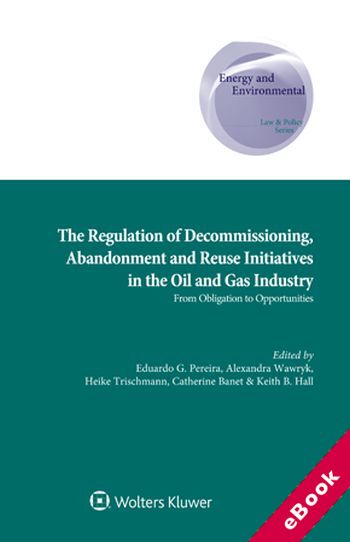
The device(s) you use to access the eBook content must be authorized with an Adobe ID before you download the product otherwise it will fail to register correctly.
For further information see https://www.wildy.com/ebook-formats
Once the order is confirmed an automated e-mail will be sent to you to allow you to download the eBook.
All eBooks are supplied firm sale and cannot be returned. If you believe there is a fault with your eBook then contact us on ebooks@wildy.com and we will help in resolving the issue. This does not affect your statutory rights.
The Regulation of Decommissioning, Abandonment and Reuse Initiatives in the Oil and Gas Industry is an expansive book which divulges a comprehensive description and critique of the key issues that must be addressed by nations, and of the current international, regional, and national law and policy in this field. With thousands of offshore oil and gas platforms in place across the globe, the decommissioning of these ageing installations is becoming of increasing concern to regulators, industry and other stakeholders in the marine environment. This book elucidates current initiatives aimed at maximising reuse and repurposing opportunities, such as wind power, hydrogen, carbon capture, and storage by analysing the relevant law and practices of selected oil- and gas-producing nations.
Capitalising on the good decommissioning practices adopted by such distinguished jurisdictions as the United States, the United Kingdom, and Norway, the book delves deep into such key complex and topical issues as the following:
All applicable international and regional conventions with provisions on decommissioning are discussed, including the ASEAN Guidelines on Decommissioning, the Geneva Convention on the Continental Shelf, the United Nations Convention on the Law of the Sea, the International Maritime Organization Guidelines, and the North-East Atlantic OSPAR Convention. The book concludes with a chapter that summarises the issues and topics and suggests future policy and legal directions which could guide governments and parties when developing decommissioning policies, law, and agreements.
This synopsis of current complex topical issues will help readers to understand the key issues to be addressed by regulatory regimes and the complexities involved in dealing with each of these issues. It will prove to be an asset for governments, lawyers, the offshore industry, environmentalists, and other stakeholders to ascertain current trends and best-practice approaches to decommissioning.